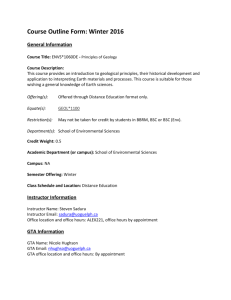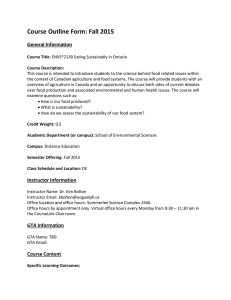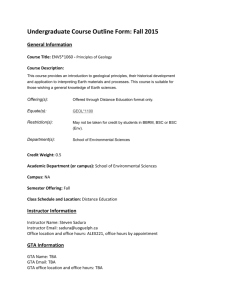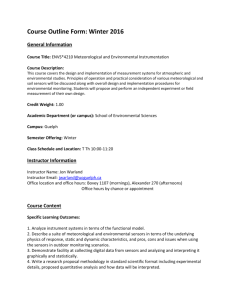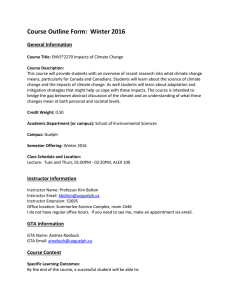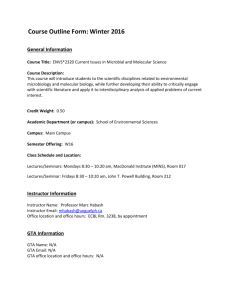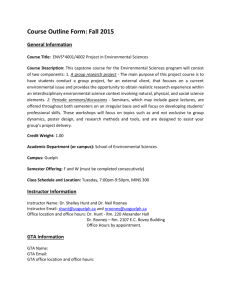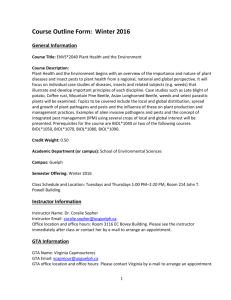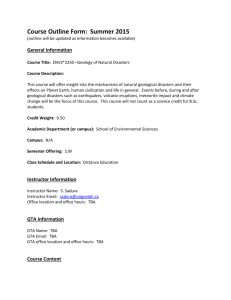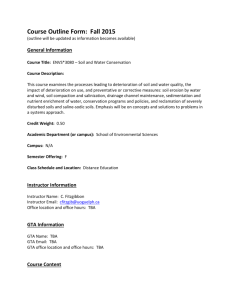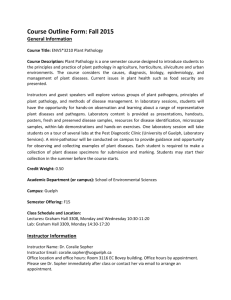ENVS*2230 Communications in Environmental Sciences
advertisement
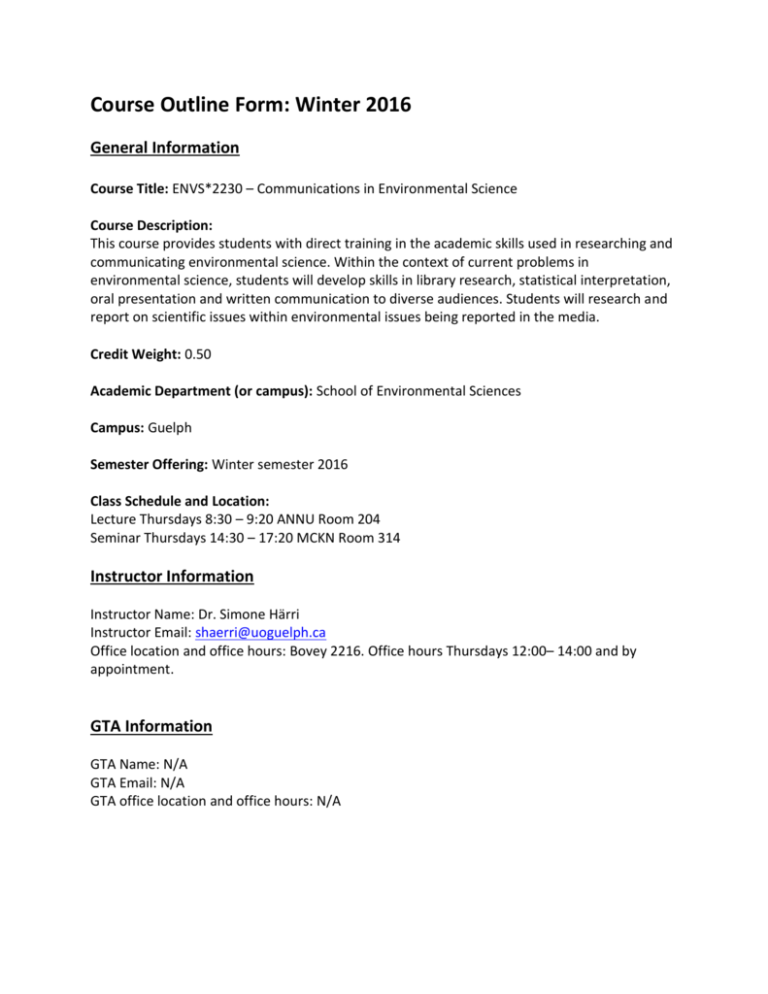
Course Outline Form: Winter 2016 General Information Course Title: ENVS*2230 – Communications in Environmental Science Course Description: This course provides students with direct training in the academic skills used in researching and communicating environmental science. Within the context of current problems in environmental science, students will develop skills in library research, statistical interpretation, oral presentation and written communication to diverse audiences. Students will research and report on scientific issues within environmental issues being reported in the media. Credit Weight: 0.50 Academic Department (or campus): School of Environmental Sciences Campus: Guelph Semester Offering: Winter semester 2016 Class Schedule and Location: Lecture Thursdays 8:30 – 9:20 ANNU Room 204 Seminar Thursdays 14:30 – 17:20 MCKN Room 314 Instructor Information Instructor Name: Dr. Simone Härri Instructor Email: shaerri@uoguelph.ca Office location and office hours: Bovey 2216. Office hours Thursdays 12:00– 14:00 and by appointment. GTA Information GTA Name: N/A GTA Email: N/A GTA office location and office hours: N/A Course Content Specific Learning Outcomes: 1) Develop and write a scientific research paper including researching literature, designing an experiment and statistically analyse data. 2) Communicate effectively an important environmental issue to a lay audience using various media tools 3) Practice extemporaneous (without many notes) oral presentations in front of your peers 4) Identify and discuss challenges for scientific writing by editing and simplifying texts 5) Critically analyse scientific publications and correctly interpret statistical data by presenting a summary of primary literature on a contemporary environmental issue 6) Demonstrate your understanding of the important aspects of effective communication by evaluating presentations and written work by your peers Lecture Content: Week 1 Week 2 Week 3 Week 4 Week 5 Week 6 Week 7 Week 8 Week 9 Week 10 Week 11 Week 12 Week 13 Introduction and course outline. Tips and tricks for oral presentations Student presentations and peer evaluation Introduction to research paper assignment – components of a paper References and how to avoid plagiarism WINTER BREAK How to present data? How to give feedback? Introduction to the science communication assignment Science communication examples Student presentations and peer evaluation TBD Wrap-up Labs: N/A Seminars: Week 1 Week 2 Week 3 Week 4 Week 5 Getting to know each other, peer-review process and the importance of science communication. Tips and tricks for oral presentations. Literature search and critically interpret graphs. Student presentations (includes peer evaluation) Scientific writing workshop I Scientific writing workshop II Week 6 Week 7 Week 8 Week 9 Week 10 Week 11 Week 12 Week 13 WINTER BREAK Scientific writing workshop III Peer-evaluation of draft papers Science communication workshop I Science communication workshop II Student presentations (includes peer evaluation) Work on your communication piece/get input from instructor Science communication exhibit Course Assignments and Tests: Assignment or Test Due Date Contribution to Final Mark (%) 20% Learning Outcomes Assessed 2, 3, 5 Paper (oral) presentations (10 % each) Seminar participation (includes peer evaluations) Research paper draft Research paper final Science communication (individual or group) January 28 & March 24, 2016 Ongoing 30% 1, 2, 3, 4, 5, 6 March 1, 2016 March 22, 2016 April 5, 2016 20% 10% 20% 1, 4, 6 1, 6 2, 6 Additional Notes (if required): Seminar participation is based on worksheets distributed during every week’s lecture and seminar. Ten out of the 12 total worksheets will count towards your grade. Each worksheet will be assessed on a simple grading scale: “excellent”, “good”, “meeting minimum requirement” or “fail”. Worksheets also include peer evaluations. Final examination date and time: N/A Final exam weighting: N/A Course Resources Required Texts: N/A Recommended Texts: N/A Lab Manual: N/A Other Resources: D2L: The instructor uses CourseLink for posting class announcements, hand-outs, slides from lectures, class readings, grades and other required and recommended materials that is relevant to this course. You are responsible to check this site often. Field Trips: N/A Additional Costs: N/A Course Policies Grading Policies: Assignments are to be submitted online via D2L before midnight on the due date. Assignments handed-in late, for which an extension has not been granted ahead of time, will lose 10% of the total marks for every day (or part thereof) that it is late. If you require an extension on an assignment, you must have a valid reason and contact Dr. Härri in advance of the due date. Course Policy on Group Work: This course encourages group work and collaborative problem solving for solving the worksheets during the lectures and seminars. The science communication assignment can either be completed as a group or individually. The research paper and paper presentations should reflect the opinion of the student alone and should be the original work of the student. For group assignments, the completed assignment should contain only work which has been produced by members of the group in question. Course Policy regarding use of electronic devices and recording of lectures: Electronic recording of classes is expressly forbidden without consent of the instructor. When recordings are permitted they are solely for the use of the authorized student and may not be reproduced, or transmitted to others, without the express written consent of the instructor . University Policies Academic Consideration: The University of Guelph is committed to supporting students in their learning experiences and responding to their individual needs and is aware that a variety of situations or events beyond the student's control may affect academic performance. Support is provided to accommodate academic needs in the face of personal difficulties or unforeseen events in the form of Academic Consideration. Information on regulations and procedures for Academic Consideration, Appeals and Petitions, including categories, grounds, timelines and appeals can be found in Section VIII (Undergraduate Degree Regulations and Procedures) of the Undergraduate Calendar. Academic Misconduct: The University of Guelph is committed to upholding the highest standards of academic integrity and it is the responsibility of all members of the University community, faculty, staff, and students to be aware of what constitutes academic misconduct and to do as much as possible to prevent academic offences from occurring. University of Guelph students have the responsibility of abiding by the University's policy on academic misconduct regardless of their location of study; faculty, staff and students have the responsibility of supporting an environment that discourages misconduct. Students need to remain aware that instructors have access to and the right to use electronic and other means of detection. Please note: Whether or not a student intended to commit academic misconduct is not relevant for a finding of guilt. Hurried or careless submission of assignments does not excuse students from responsibility for verifying the academic integrity of their work before submitting it. Students who are in any doubt as to whether an action on their part could be construed as an academic offence should consult with a faculty member or faculty advisor. Detailed information regarding the Academic Misconduct policy is available in Section VIII (Undergraduate Degree Regulations and Procedures) of the Undergraduate Calendar. Accessibility: The University of Guelph is committed to creating a barrier-free environment. Providing services for students is a shared responsibility among students, faculty and administrators. This relationship is based on respect of individual rights, the dignity of the individual and the University community's shared commitment to an open and supportive learning environment. Students requiring service or accommodation, whether due to an identified, ongoing disability or a short-term disability should contact the Student Accessibility Services (SAS), formerly Centre for Students with Disabilities (CSD), as soon as possible. For more information, contact SAS at 519-824-4120 ext. 56208 or email sas@uoguelph.ca or visit the Student Accessibility Services website (http://www.uoguelph.ca/csd/). Course Evaluation Information: End of semester course and instructor evaluations provide students the opportunity to have their comments and opinions used as an important component in the Faculty Tenure and Promotion process, and as valuable feedback to help instructors enhance the quality of their teaching effectiveness and course delivery. While many course evaluations are conducted in class others are now conducted online. Please refer to the Course and Instructor Evaluation Website for more information. Drop period: The drop period for single semester courses starts at the beginning of the add period and extends to the Fortieth (40th) class day of the current semester (the last date to drop a single semester courses without academic penalty) which is listed in Section III (Schedule of Dates) of the Undergraduate Calendar. The drop period for two semester courses starts at the beginning of the add period in the first semester and extends to the last day of the add period in the second semester. Information about Dropping Courses can be found in Section VIII (Undergraduate Degree Regulations and Procedures) of the Undergraduate Calendar. Additional Course Information None
